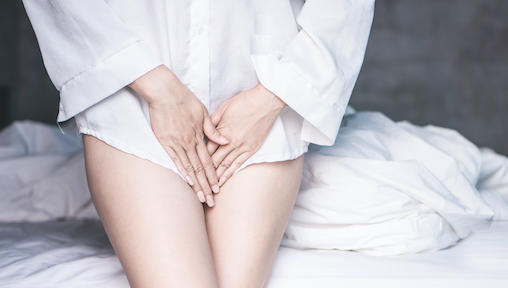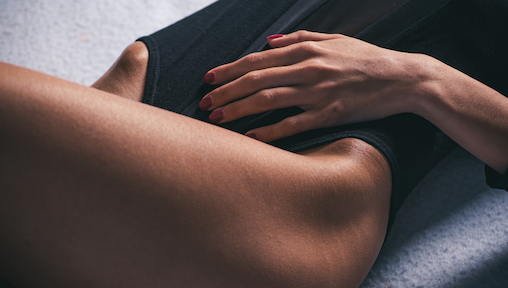
Women’s Health Doctor, Dr Jessherin Sidhu, Answers Burning Questions New Mums Have About Their Bodies Postpartum

We know many women have burning questions about their bodies postpartum. Dr Jessherin Sidhu, Founder of Insync Medical, a GP+ clinic that focuses on sexual wellness and women’s health answers their burning postpartum questions about their bodies.
Vanilla Luxury: Why can’t I seem to have control over my bladder postpartum?
Dr Jessherin Sidhu: It is undeniable that urinary incontinence is a common problem. Up to 37% of women aged between 20-39 report some form of urinary incontinence1.
Many women have a misconception that urinary incontinence is a problem of older women. This is far from the truth, urinary incontinence, in particular, stress urinary incontinence affects younger women, especially women who have been pregnant. This is not limited only to women who have given birth vaginally. Women who have been pregnant and given birth by Caesarean section also are at real risk of stress urinary incontinence.
Stress incontinence is more often seen in younger women postpartum. This happens when you’re laughing, sneezing, coughing, carrying heavy weights, jumping and as such, experience urinary leaks.
The sheer stretch from the load that is carried over the 3 trimesters of pregnancy causes trauma and damage to the muscles, the supportive structures called the fascia and the nerves of the pelvic floor. These structures all work together to allow for continence of urine. When they suffer damage, the structures can no longer as effectively prevent urinary leakage hence creating a problem of urinary incontinence.

Vanilla Luxury: Will my postpartum urinary incontinence go away on its own?
Dr Jessherin Sidhu: The first step is to consult your women’s health doctor for a correct diagnosis. Urinary incontinence postpartum does not go away on its own. However, there are several solutions to treat urinary incontinence. The pelvic floor muscles, its supportive structures like the fascia and nerves that supply the area are probably of the most neglected parts of our body. Let alone pregnancy, many day-to-day activities like unguided exercise can cause damage to our pelvic floor. There many strategies that can be put in place to precondition and strengthen the pelvic floor and to resolve or reduce urinary incontinence once it’s started.
Physiotherapy can assist with achieving pelvic floor muscle contractions which many women find hard to localise. Hence it’s best to work with a women’s health physiotherapist for best results.
Vaginal lasers such as the CO2 laser is a painless yet effective procedure to treat urinary incontinence. Most patients commonly require 3 sessions over a period of 3 months to see an improvement.
The O-shot uses a mixture of platelet-rich-plasma (PRP) and hyaluronic acid that is injected painlessly into your vulva in the region between the urethral opening and the vaginal opening to help treat urinary incontinence. This PRP is milieu rich in growth factors that when concentrated in that area of your vulva, causes growth of new cells and collagen.
Vaginal estrogens in the form of a cream or tablet have shown to provide some control for urinary incontinence.
Vanilla Luxury: Will my vagina be the same postpartum?
Dr Jessherin Sidhu: 58% of women lose vaginal tightness postpartum. Vaginal childbirth stretches the vaginal tissues beyond their elastic limits. The vaginal tears suffered during delivery can heal completely and the muscles can restrengthen, however, the vagina will permanently be larger than its original size.
Vanilla Luxury: What should I take note of when I'm ready to have sex again after childbirth?
Dr Jessherin Sidhu: If the thought of re-engaging in sexual intercourse that involves vaginal penetration post-childbirth, makes you nervous or anxious or generates a sense of fear, I would strongly advise that you speak to a doctor who deals with sexual wellness.
Sex is not just penetrative, there is so much more creativity to it. One can start slow with external vulva stimulation and gradually take it up penetration starting first with vibrators and then when more comfortable and when you feel ready to engage in penile penetration.
Keep your partner in the loop about how you feel about vaginal penetration after childbirth. It’s only with this awareness, that he’ll be able to start to understand your concerns and then you both can in agreement and creatively come up with alternatives to vagina-penile penetration. Intimate connection with your partner can still be had without vaginal penetration – keep your intimacy with your partner focused on good sensations and pleasure.
Vanilla Luxury: What are the recommended solutions for postpartum vaginal tightening?
Dr Jessherin Sidhu: There are new advancements in medicine that now offer vaginal tightening solutions through the use of lasers, radiofrequency and even surgery. It is highly recommended that you speak with your women’s health doctor to explore the option best suited for you.
One solution for vaginal tightening is the CO2 laser which are fractional lasers that creates multiple little columns of painless intentional damage through the top layers of the vaginal walls. CO2 lasers are able to penetrate deeper into the collagen area so that purposeful damage is done in order to stimulate the formation of new collagen.
Gursheel Dhillon

Gursheel Dhillon is a seasoned marketer and communicator who currently serves as the Head of Marketing for FCM Travel Asia. An award-winning entrepreneur with over a decade of business experience, she also founded Vanilla Luxury in 2015, where she is the director of the affordable luxury lifestyle magazine. Connect with her on LinkedIn or Instagram at @GursheelDhillon.
Gursheel Dhillon More articles by this author



























 Home
Home About Us
About Us